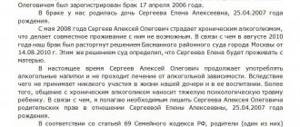In 2021, we covered the narrow topic of whether a child can be deprived of parental rights. But we forgot to talk in general about such a phenomenon as deprivation of parental rights. We'll tell you in detail.
Parents, in accordance with the Family Code of the Russian Federation, have equal rights and bear equal responsibilities in relation to their children. Parents are obliged to raise their children and protect their rights and interests. Parental rights cannot be exercised in conflict with the interests of children. Parents who shirk their parental responsibilities may be deprived of parental rights.
Deprivation of parental rights is an exceptional measure that entails serious legal consequences for both the parent and his child.
According to Article 69 of the Family Code of the Russian Federation, parents (or one of them) may be deprived of parental rights. The procedure for this procedure is described in the Family Code of the Russian Federation, as well as a list of grounds for deprivation of parental rights.
There are only 6 grounds for deprivation of parental rights, which must be supported by indisputable evidence.
Why can parental rights be deprived? Grounds
- Evasion of parental responsibilities, including malicious evasion of paying alimony (evasion of parental responsibilities presupposes systematic, that is, repeated failure to fulfill parental duties, lack of care for one’s children, no matter how it is expressed. Article 69 of the Family Code of the Russian Federation distinguishes such a form of evasion of parental responsibilities as malicious evasion of paying alimony. In this case, it is not necessary that this fact be confirmed by an appropriate court verdict. It is enough to convince the court of the parent’s constant desire to evade paying alimony, to deny their children financial support).
- Refusal, without good reason, to take your child from a maternity hospital or other medical institution, educational institution, social welfare institution or other similar institutions.
- Abuse of one’s parental rights (creating conditions that impede or make it impossible for the child to fully develop, the child to receive an education; teaching the child to drink alcohol or drugs; using the child to commit a crime).
- Abuse of children (cruel treatment of children by parents consists not only of physical, but also mental violence against them. Physical violence is beatings, infliction of physical suffering in any way. Mental violence is expressed in threats, instilling a sense of fear, suppressing any will of the child) .
- Chronic alcoholism or drug addiction of a parent (chronic alcoholism or drug addiction of a parent must be confirmed by an appropriate medical report. Deprivation of parental rights on this basis can be carried out regardless of the recognition of the defendant as having limited legal capacity through the court).
- Committing an intentional crime against the life or health of a child or against the life and health of a spouse (in this case, the claim requires a court verdict confirming the crime committed).
Procedure for deprivation of parental rights
Deprivation of parental rights is carried out in court. The case of deprivation of parental rights is considered upon the application of one of the parents or persons replacing them, the prosecutor, as well as upon the application of the bodies or institutions charged with protecting the rights of minor children (guardianship and trusteeship authorities, commissions for minors, institutions for children - orphans and children left without parental care).
In a trial, circumstances must be proven that indisputably confirm the guilt of the parent and the fact that it is impossible to change the parent’s behavior for the better.
Deprivation of parental rights does not relieve parents from the obligation to support their child. There also remains an obligation to participate in additional expenses for the child (treatment, education, etc.).
Immediately after the deprivation of parental rights of both parents, the child falls into the category of those left without parental care. The same thing happens in cases where the second parent cannot or does not want to take full care of his child, which is revealed by the court in the process of considering a claim for deprivation of parental rights, as well as in cases where a single mother or father is deprived of parental rights raising a child without a mother.
If it is impossible to transfer the child to another parent or in the event of deprivation of parental rights of both parents, the child is transferred to the care of the guardianship and trusteeship authority. At the same time, the adoption of a child in the event of deprivation of parents (one of them) of parental rights is permitted no earlier than the expiration of six months from the date of the court decision on deprivation of the parents, or one of them, of parental rights.
Simultaneously with the decision on the issue of deprivation of parental rights, the court also decides the issue of further cohabitation of the child and parents (one of them), deprived of parental rights in the manner prescribed by the current housing legislation. Housing Code of the Russian Federation in Art. 91 provides for the possibility of eviction from residential premises provided under a social tenancy agreement, without providing another residential premises, of citizens deprived of parental rights, if the cohabitation of these citizens with children in respect of whom they are deprived of parental rights is recognized by the court as impossible. If the apartment is owned by a child or another parent, then the parent deprived of parental rights may also be evicted, because from the moment of deprivation of parental rights, he is no longer considered a member of his child’s family and such eviction is provided for by the norms of housing legislation of the Russian Federation. If a parent and child live in an apartment that belongs to them equally or the owner of the property is the parent himself, deprived of parental rights, then he is not evicted. If the court decides that it is impossible for a child to live together with a parent deprived of parental rights, the child is moved, but the right of ownership of the residential premises and the right to reside there is retained by the child for the entire time of his absence. Children of parents deprived of parental rights remain, by law, among the first-degree heirs of their parents.
Commentary on Article 70 of the RF IC
1. Deprivation of parental rights in accordance with the commented article is carried out in court. In a trial, circumstances must be proven that indisputably confirm the guilt of the parent and the fact that it is impossible to change the parent’s behavior for the better.
Cases are assigned for trial in court after receiving from the guardianship and trusteeship authorities inspection reports of the living conditions of persons applying to raise a child, drawn up and approved in the prescribed manner.
When preparing for the trial of a case on deprivation of parental rights of one of the parents, in order to protect the rights of a minor and ensure appropriate conditions for his further upbringing, as well as protect the rights of the other parent who does not live with the child, it is necessary in each case to notify this parent about the time and place of the trial and explain that he has the right to make a demand to transfer the child to him for upbringing (clause 2 of the Resolution of the Plenum of the Supreme Court of the Russian Federation of May 27, 1998 No. 10 “On the application of legislation by courts in resolving disputes related to the upbringing of children”).
With regard to chronic alcoholism and drug addiction, Resolution of the Plenum of the Supreme Court of the Russian Federation of May 27, 1998 No. 10 “On the application of legislation by courts in resolving disputes related to the upbringing of children” in paragraph 11 on this matter indicates that chronic alcoholism or drug addiction in parents should be confirmed by an appropriate medical report.
If the court, when considering a case on deprivation of parental rights, finds signs of a criminal offense in the actions of the parents (one of them), it is obliged to notify the prosecutor about this.
Cases of deprivation of parental rights are considered upon the application of one of the parents or persons replacing them, an application from the prosecutor, as well as upon applications from bodies or organizations charged with protecting the rights of minor children. Paragraph 1 of the commented article provides an approximate list of such organizations.
Other persons who become aware of a violation of the rights of a child (relatives, neighbors, etc.) are not granted such a right, but by virtue of clause 3 of Art. 56 IC (see commentary to it) are required to report this to the guardianship and trusteeship authority or the prosecutor, who decide to go to court.
If the demand for deprivation of parental rights is presented to only one of the parents, then the court must find out where the other parent is and involve him in participation in the case.
2. Cases of deprivation of parental rights are considered with the participation of the prosecutor and the guardianship and trusteeship authority. Other interested parties can only submit an application to the guardianship and trusteeship authorities or to the prosecutor, who decide whether such an application is justified and, depending on this, whether to go to court.
3. Simultaneously with the consideration of the case on deprivation of parental rights, the court decides the issue of collecting child support from the parents (one of them) deprived of parental rights.
4. Paragraph 4 of the commented article talks about the obligation of the court to inform the prosecutor if signs of a criminal offense are detected in the actions of the parents (one of them). Obviously, the legislator had in mind any criminal act, but most often we are talking about the following crimes:
— involvement of a minor in the commission of a crime (Article 150 of the Criminal Code);
— involvement of a minor in the commission of antisocial actions (Article 151 of the Criminal Code);
— failure to fulfill or improper fulfillment of duties for raising a minor (Article 156 of the Criminal Code);
— beatings (Article 116 of the Criminal Code), torture of a child (Article 117 of the Criminal Code);
— violent acts of a sexual nature against a child (Article 132 of the Criminal Code of the Russian Federation).
5. Deprivation of parental rights is one of the legal facts that are subject to registration with the registry office. In this regard, paragraph 5 of the commented article establishes a rule according to which the court, within three days from the moment when the relevant decision entered into legal force, is obliged to send an extract from it to the registry office.
Consequences of deprivation of parental rights
In accordance with Art. 71 of the Family Code of the Russian Federation, parents deprived of parental rights lose all rights based on the fact of relationship with children: to the personal education of their children; to communicate with the child; to protect the rights and interests of the child; to receive future maintenance from their adult children; for inheritance by law in the event of the death of a son (daughter).
Typically, persons deprived of their parental rights remember their children when they grow old and have no means of their own to support themselves. But it is no longer necessary to talk here about the continuity of generations in terms of the mutual care of the elders for the younger (and vice versa), because the connection between them was broken due to the fault of those who did not fulfill their parental duty. Therefore, adult children are exempt from paying child support to parents deprived of parental rights. For the same reasons, persons who were deprived of parental rights in relation to these children and were not restored to these rights at the time of opening of the inheritance are excluded from the list of heirs after their children. However, children have the right to bequeath their property to parents deprived of parental rights. The second group of rights that a person deprived of parental rights loses are rights associated with various types of benefits provided by the state to parents.
All consequences of deprivation of parental rights remain in force until parental rights are restored by the court. By regulating the procedure for protecting the rights and interests of a child by depriving negligent parents of their parental rights, the legislation also provides for the possibility of restoring the original situation. So, according to Art. 72 of the Family Code of the Russian Federation, parents or one of them can be restored to parental rights in cases where they have changed their behavior, lifestyle and (or) attitude towards raising a child.
Restoration of parental rights is carried out in the same manner as deprivation, i.e. in judicial The basis for the court to consider the issue is the application of a parent deprived of parental rights. Cases on restoration of parental rights are considered with the participation of the guardianship and trusteeship authority, as well as the prosecutor. Simultaneously with the application for restoration of parental rights, a request for the return of the child to the parents, or one of them, may be considered. Taking into account the child’s opinion, the court has the right to refuse to satisfy the claim of the parents (one of them) for restoration of parental rights if restoration of parental rights is contrary to the interests of the child. Restoration of parental rights in relation to a child who has reached the age of ten years is possible only with his consent.
Restoration of parental rights if the child is adopted and the adoption has not been cancelled, is not allowed.
Who can initiate the process of depriving parental rights
To start the process of depriving the right to raise children, someone's initiative is needed. Who exactly can initiate the issue of deprivation of rights to raise children in accordance with the legislation of the Russian Federation? The existing regulatory framework regulates a rather limited circle of persons. In particular, it is worth highlighting:
- one of the parents (father or mother); legal guardian or guardian;
- heads of the guardianship authority, shelter, orphanage and other organizations for the protection of children's rights;
- prosecutor.
Each of the above can file a claim in court. Other citizens can act as witnesses.
It is also worth noting that the opinion of the child himself is also taken into account, but only if he has reached the age of ten.
Another comment on Art. 70 of the Family Code of the Russian Federation
1. Deprivation of parental rights is carried out only by a court in civil proceedings.
2. The circle of persons upon whose applications the courts consider cases of deprivation of parental rights is exhaustively defined in paragraph 1 of Article 70 of the RF IC. These include: one of the parents, regardless of whether he lives with the child; persons acting in loco parentis: adoptive parents, guardians, trustees, foster parents; prosecutor; body or institution entrusted with the responsibility for protecting the rights of minor children (guardianship and trusteeship authorities, commissions for minors, institutions for orphans and children left without parental care: children's homes, boarding schools, orphanages, homes for the disabled, social rehabilitation centers for minors, assistance centers for children without parental care, territorial centers for social assistance to families and children, social shelters for children, boarding schools for children with physical disabilities, etc.).
3. When preparing for the trial of a case on deprivation of parental rights of one of the parents, the judge, in order to protect the rights of the minor and ensure appropriate conditions for his further upbringing, as well as protect the rights of the parent who does not live with the child, must in each case notify this parent about the time and the place of the trial and explain that he has the right to demand that the child be transferred to him for upbringing.
Deprivation of parental rights of the child's father
Why can a father's parental rights be deprived? All the main reasons have already been mentioned above. At the same time, the most common and widespread circumstance under which a parent may be deprived of the right to raise children remains evasion of payment of alimony.
The fact of non-payment of alimony must be proven. This is often not so simple; for example, the father may present to the court evidence of his inability to regularly pay amounts of money.
For example, a parent may be laid off at work, become seriously ill, become disabled, be registered with the employment service, etc.
If the father is nevertheless deprived of parental rights, you can think about appealing to the cassation court.
There are cases when the whereabouts of the father are completely unknown. Then the court has the right to turn to the police and the Federal Migration Service to provide information about the missing parent.









